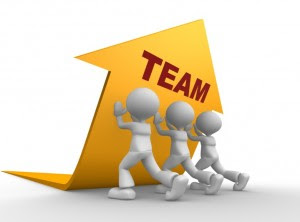Leaving the development of a positive team culture up to chance is a very risky decision. Team leaders, project managers, and department managers can play an active role in enhancing the sense of team culture, collaboration, and performance within their teams.
In the same way, organizational leaders can work on building entire workplace cultures. The strategies are not different; they are just implemented on a larger and more universal scale across the organization.
To get started in creating a positive and focused team culture either virtually or in-person, leaders can implement the following tips. The more consistently and organization-wide the focus on building culture will be, the greater the results.
Set Team Goals
While there are often organizational or department goals, it is also an effective exercise to work through team-specific goal setting. By setting goals that are important to the team, all members see their value in helping to make these meaningful achievements. Teams that set goals together are more likely to strive to meet and exceed those goals as part of their ongoing improvement efforts.
Create Team Roles
Within the team, individuals should develop their role or roles that maximize their potential by capitalizing on their talents, gifts, and areas of expertise. This is also a way for everyone on the team to be an active contributor and to also have a place in the project or process.
Focus on Creativity and Collaboration
Building in time to brainstorm, share creative ideas, and collaborate on possible solutions is a valuable way to build an effective team culture. As a leader, model this behavior by discussing new ideas and options and accepting different opinions and perspectives.
Provide Resources
In-person and virtually, teams need resources to be successful. To build a team culture, the team has to have the materials and resources needed to do their job. While resources will always be limited to some degree, focus on advocating for what the team needs and supporting the team in creating ways to find the resources.
Build Individual Strengths
When individuals are confident and see themselves as valuable to the team and the organization, they are more collaborative and less self-protective with their knowledge, skills, and talents. Building culture also means recognizing individual contributions as well as team wins.
By adding diverse training, job shadowing, mentoring, coaching, and team building exercises, everyone grows together, forming a stronger and more effective culture.

